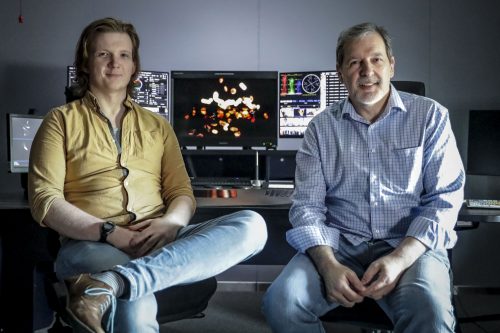BBC Street, the in-house post-production facility at BBC Scotland in Glasgow, has installed a new Baselight system to upgrade their grading and finishing suite with Baselight’s latest powerful 4K/HDR toolset and to improve their client experience.
BBC Street works for external clients as well as internal productions, which are broadcast on national and international BBC services, BBC Scotland and BBC Alba, the Gaelic language channel, and cover a wide range of programmes including adult and children’s drama, short films, and documentary features.
The new Baselight TWO fits into BBC Scotland’s workflow in many ways.
“We wanted to upgrade the Baselight grading suite to improve both the creative and technical functionality, and indeed the customer experience,” said colourist Tom Nicol. “Having access to the latest Baselight software allows us to offer the highest-quality service in line with the market and broaden our potential client base.
“That is appealing to clients and will encourage them to finish with us – grade, online, dub and delivery,” Nicol explained. “It also future-proofs us for new business requiring 4K/HDR grading and delivery.”
Fellow colourist Mike Trevett added, “We also use Baselight for rescue work (if a production has had problems on the shoot) and some effects and compositing. Baselight TWO has only made that work much easier.
“Being able to grade a variety of footage shot on different cameras, with archive thrown in, and know that you’ll have a uniform scene-referred working experience, and that what you see is what you will get when it comes out the other end, is valuable on a lot of levels,” he said.

Mike Trevett (left) and Tom Nichol
As well as the upgrade, BBC Street has also implemented render-free circular workflows on many productions, using Baselight for Avid plugins in multiple rooms. This means that editorial and finishing staff see the latest grade in context, and Avid editors can make tweaks if necessary without round-tripping the content to the grading suite — saving the need for extra transcoding and rendering steps. This is possible because of Baselight’s BLG format, which retains all content in its native form all the way until the deliverables are created, and also the Baselight Lens, which when pointed at a directory of BLG files enables Baselight for Avid to apply the correct grade to each Avid clip automatically.
Broadcast timescales can be very tight, and Tom Nicol believes that the Baselight approach makes the very best of the time available. “We can address more finishing requirements in the grading suite,” he said. “It reduces time spent on correction and matching sources, so more actual grading can take place – and in 4K/HDR!”
Trevett agreed, “The new Baselight TWO with its version 5 release is a fundamental improvement on the previous version, retaining everything about the software that we enjoyed from an operational standpoint. The new FilmLight colour spaces and the improvements made to the already excellent Colour Space Journey are spot on, enhancing the experience of both the colourists and the programme makers.”



